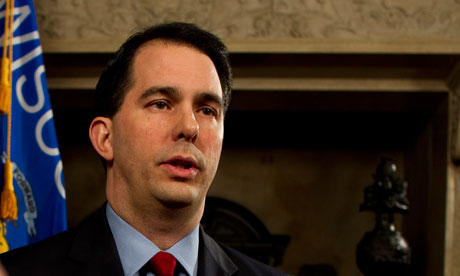Submitted by Jessica Opoien on
 Governor Scott Walker will sign the controversial state budget bill into law June 26. He was originally scheduled to sign his budget at Badger Sheet Metal Works, a private business operated by a man with six felony tax convictions, in Green Bay, at 2 p.m. on Sunday. However, now that Gregory A. DeCaster's tax troubles have been publicized, the governor's office has announced a new location for the ceremony: Fox Valley Metal Tech, also in Green Bay.
Governor Scott Walker will sign the controversial state budget bill into law June 26. He was originally scheduled to sign his budget at Badger Sheet Metal Works, a private business operated by a man with six felony tax convictions, in Green Bay, at 2 p.m. on Sunday. However, now that Gregory A. DeCaster's tax troubles have been publicized, the governor's office has announced a new location for the ceremony: Fox Valley Metal Tech, also in Green Bay.
"While Mr. DeCaster has served his time in jail and paid his debt to society, it is fitting that the governor would choose to sign this budget at a business owned by someone who was once convicted of the felony of tax evasion," said Marc Norberg, a Wisconsin native and assistant to the general president of the Sheet Metal Workers' International Association.
Department of Administration Secretary Mike Huebsch said something quite similar earlier in the day when he told WisPolitics, "Green Bay, and certainly the company that we're going to, reflects really what this budget and what Gov. Walker's first term here is all about."
Will the budget bill be a job creator?
According to the Milwaukee Journal Sentinel, Walker chose to sign the budget at a manufacturer "to emphasize the budget's focus on job creation."
Gov. Scott Walker boasted that his budget proposals and other controversial policies have created 25,000 jobs in Wisconsin since the start of the year at a discussion led by the U.S. Chamber of Commerce on Monday in Washington, D.C.
CMD contacted the Center for Wisconsin Strategy, a field laboratory for high-road economic development in the state for a bit of perspective on this spin.
"While we don't think the governor has that much ability to affect overall employment … to the extent that he has, he has arguably hurt the state," said Sam Munger, managing director of the Center on Wisconsin Strategy's Center for State Innovation.
Munger said a significant amount of provisions in the budget will end up destroying the quality of jobs that currently exist.
According to a recent Center of Wisconsin Strategy report, the 8 percent wage cut Walker issued to the 380,000 jobs under his control could cost Wisconsin about 22,000 additional jobs, "because families that rely on the income from their public-sector jobs will have less to spend in their local communities."
"If you look all the way through the budget … his primary motivation has not been keeping jobs, it's been remaking the state as a corporate welfare haven," Munger said, citing Walker's refusal of federal stimulus money and federal broadband money and his refusal to engage the state in other job-generating projects, while rewarding the wealthy and corporations with a range of tax breaks.
The budget's cuts to municipalities will suck money out of localities, Munger said, adding that pulling money out of circulation will cost jobs in an indirect or induced way. In contrast to the rosy news coming from the Governor's mansion, the most recent data from the Department of Workforce Development shows that unemployment increased in most Wisconsin cities in the month of May. The report shows that unemployment rates increased in 25 cities with a population of 25,000 people or more, with only Stevens Point experiencing a slight drop, from 7.9 percent to 7.8 percent.
Other budgetary measures that Munger said threaten job quality are cuts to childcare subsidies for working parents, making it more difficult to obtain unemployment insurance and rolling back child labor laws.
"Everything that he has done in the budget that related to jobs or employment has either killed jobs, destroyed the quality of jobs or been a giant giveaway to corporations," Munger said.
